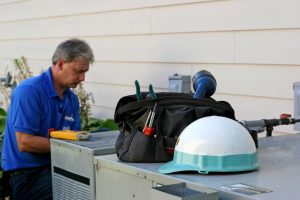When temperatures rise, your air conditioner becomes an essential part of maintaining comfort in your home. However, like any other appliance, your AC can develop issues over time, and knowing what to look out for can save you from a complete system breakdown.
We believe an informed homeowner is better equipped to prevent small issues from escalating into costly repairs. In this blog post, we’ll walk you through several common AC repair types you may encounter so you’ll know what to watch for and when to call a professional.
1. Refrigerant Leaks
The refrigerant in your AC is crucial for cooling the air before it’s circulated throughout your home. When the refrigerant level is too low, your system may struggle to cool your home effectively, resulting in higher energy bills and inadequate cooling. Signs of a refrigerant leak include:
- Warm Air: If your AC is blowing warm air, it could be due to low refrigerant levels.
- Hissing Sounds: A hissing noise near the refrigerant lines could indicate a leak.
- Frozen Evaporator Coils: Low refrigerant can cause the evaporator coils to freeze, leading to a complete system shutdown.
2. Electrical Problems
Your AC relies on various electrical components to function correctly, including capacitors, contactors, and wiring. Electrical issues can lead to frequent system shutdowns, a complete lack of power, or erratic performance. Some common electrical problems include:
- Faulty Capacitors: Capacitors provide the initial jolt of energy needed to start your AC’s motors. When they fail, your system may struggle to start or run efficiently.
- Worn Out Contactors: Contactors are responsible for turning on the AC’s compressor and condenser fan motor. A worn-out contactor can cause the system to stop working or function intermittently.
- Damaged Wiring: Over time, wiring can degrade or become damaged, leading to shorts or power loss in your system.
3. Clogged Drain Lines
Air conditioners remove moisture from the air as part of the cooling process, and this moisture is typically drained away through a condensate drain line. However, these lines can become clogged with dirt, algae, or debris over time. A clogged drain line can cause water to back up into your system, leading to:
- Water Damage: Overflowing water can damage your AC unit or even cause water damage to your home.
- Musty Odors: Stagnant water in the drain pan can create a breeding ground for mold and mildew, resulting in unpleasant odors.
- AC Shutdown: Many modern AC systems have a safety switch that shuts down the unit if the drain line is clogged to prevent water damage.
4. Frozen Evaporator Coils
Evaporator coils are responsible for absorbing heat from the air in your home. However, when airflow is restricted or refrigerant levels are low, these coils can freeze, preventing your AC from cooling effectively. Signs of frozen evaporator coils include:
- Reduced Airflow: If you notice a decrease in the amount of air coming from your vents, it could be due to frozen coils.
- Ice Buildup: Visible ice on the indoor unit is a clear sign of frozen evaporator coils.
- Increased Humidity: Your AC also dehumidifies your home, so if the coils are frozen, you may notice higher indoor humidity levels.
5. Thermostat Malfunctions
Sometimes, the issue with your AC isn’t the unit itself but the thermostat controlling it. A malfunctioning thermostat can cause your AC to run continuously, shut off prematurely, or not turn on at all. Common thermostat issues include:
- Incorrect Temperature Readings: If your thermostat isn’t reading the temperature accurately, it can cause your AC to operate inefficiently.
- Unresponsive Controls: If the thermostat doesn’t respond when you adjust the temperature, it may need to be recalibrated or replaced.
- Short-cycling: A faulty thermostat can cause your AC to turn on and off rapidly, a phenomenon known as short-cycling, which can wear out your system over time.
For reliable AC repair in Warren, NJ, give us a call today!
Call Schaible’s Plumbing & Heating Inc. when you need AC repairs.

